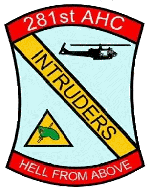The 281st Assault Helicopter Company was the first dedicated Special Operations helicopter unit in the U.S. Army. It was activated in October 1965 with the specific mission to support the 5th Special Forces Group (Airborne) and it’s newly created and highly classified Project Delta.
The 281st was required to be a totally self-supporting unit because of the specialized mission. It trained its own inexperienced pilots to provide complex aviation support that included insertions and extractions from craters created by bomb drops in dense jungle environments and small openings in the jungle that always appeared to be smaller than the helicopter.
The type of combat aviation support provided by the 281st would, under normal circumstances, have only been provided by highly-trained pilots from special aviation units. In Vietnam this was not the case. The situation demanded the creation and activation of this special unit in a critically short time frame. As a result, the average age of the Intruder pilots was 21, and average age of our crew members’ was 19.
The experience level of these crews consisted of flight school followed by on-the-job training once they got to Vietnam for the pilots and usually basic and advanced training plus unit on the job training for the crew chiefs and door gunners. These crews, in addition to the complex and dangerous recon missions of the 281st, provided resupply to the ground troops on a daily basis, evacuated the wounded and killed in action and recovered its own downed crew members. (I personally never saw a medical evacuation chopper in the 281st area of operation.)
The 281st provided and directed its own fire support and often served as the forward air controller, directing the activities of the fighter/bomber aircraft that were called in to support Delta Operations. However, most of Delta’s fire support came from the 281st’s own gunship platoon known as the Wolf Pack. These young flight crews were counted on to protect the 281st slicks and to provide deadly accurate fire in support of the Special Forces troops on the ground.
There were several very real parallels that existed between the Wolf Pack crews and the fighter pilots of other wars. In fact, I often thought that many of them may well have been reincarnated members of Pappy Boynton’s Black Sheep Squadron. The Wolf Pack platoon sergeants, along with their crew chiefs and support personnel, did a job that was above and beyond the call of duty in keeping the gunships operating and rearmed, as well as patching bullet holes sustained on each aircraft and assisting the unit aircraft maintenance personnel to maintain daily availability.
Facts and documents available after the war indicated that the air crew members who manned the Wolf Pack gunships had more exposure to enemy fire than any other individuals in the war. Although these pilots and crew members were constantly in the line of fire, I personally never heard a word of discontent from one of them, and each and every one was held in the highest esteem by all unit members. A large percentage of the door gunners for both the Wolf Pack and the Bandit platoons (crews who inserted the special operations teams) were individuals who had been wounded in ground combat units and had extended to stay in country as aircraft door gunners.
At the end of the war, there were 100 individuals missing in action from the 1st Aviation Brigade, and 10% of them were members of the 281st AHC. Of the 60+ aviation companies that were assigned to the Brigade, the average number killed in action during the entire war was 28. The 281st lost 52 or 65% more than its sister companies in its brief five year existence.
The sad part of this story is the reception these young men received when they came home to a nation unwilling to accept the sacrifices they made and the manner in which they willingly served their country.
John Mayhew
Colonel
281st AHC Unit Commander 1968
(submitted by Lou Lerda)
I served with this unit and wrote stories that are included in the book “Above The Best.” This was the first special operations helicopter unit in the Army dedicated to supporting a then highly classified mission. Not many people know about the unit and those of us who served within its ranks are fiercely proud of our service. It took its toll on all of us, but the members still consider themselves to be “brothers.”
Lou


